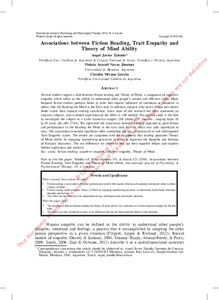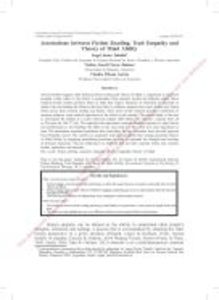Por favor, use este identificador para citar o enlazar este ítem:
https://repositorio.uca.edu.ar/handle/123456789/8560| Campo DC | Valor | Lengua/Idioma |
|---|---|---|
| dc.contributor.author | Tabullo, Ángel Javier | es |
| dc.contributor.author | Navas Jiménez, Violeta Araceli | es |
| dc.contributor.author | García, Claudia Silvana | es |
| dc.date.accessioned | 2019-08-13T19:41:05Z | - |
| dc.date.available | 2019-08-13T19:41:05Z | - |
| dc.date.issued | 2018 | - |
| dc.identifier.citation | Tabullo AJ, Navas-Jiménez VA, & García CS (2018). Associations between Fiction Reading, Trait Empathy and Theory of Mind Ability [en línea]. International Journal of Psychology & Psychological Therapy, 18(3). Disponible en: https://repositorio.uca.edu.ar/handle/123456789/8560 | es |
| dc.identifier.issn | 1577-7057 | - |
| dc.identifier.uri | https://repositorio.uca.edu.ar/handle/123456789/8560 | - |
| dc.identifier.uri | https://www.ijpsy.com/volumen18/num3/501.html | - |
| dc.description.abstract | Abstract: Several studies suggest a link between fiction reading and Theory of Mind, a component of cognitive empathy which refers to the ability to understand other people’s mental and affective states. More frequent fiction readers perform better in tasks that require inference of intentions or emotions in others, like the Reading the Mind in the Eyes task. In addition, subjects who read a fiction text obtain better scores than controls reading non-fiction. Since most of this research has been conducted on caucasic subjects, cross-cultural replication of the effect is still needed. The present study is the first to investigate the subject in a Latin American sample (208 adults -137 females-, ranging from 18 to 59 years old (M= 27.66). We replicated the association between lifelong exposure to print fiction and performance in the Reading the Mind in the eyes task, but the effect was only significant in men. The association remained significant after controlling for age, education level and self-reported Trait Empathy scores. The results are congruent with the hypothesis that reading promotes Theory of Mind ability by engaging mentalizing processes in order to represent the thoughts and feelings of fictional characters. The sex difference we observed had not been reported before and requires further replication and analysis. | es |
| dc.format | application/pdf | - |
| dc.language.iso | eng | es |
| dc.publisher | Asociación de Análisis del Comportamiento | es |
| dc.rights | Acceso Abierto. 6 meses de embargo | - |
| dc.rights.uri | https://creativecommons.org/licenses/by-nc-sa/4.0/ | - |
| dc.source | International Journal of Psychology & Psychological Therapy, 18(3), 2018 | es |
| dc.subject | EMPATIA | es |
| dc.subject | LECTURA | es |
| dc.subject | FICCION | es |
| dc.subject | TEORIA DE LA MENTE | es |
| dc.title | Associations between fiction reading, trait empathy and theory of mind ability | es |
| dc.type | Artículo | es |
| uca.disciplina | PSICOLOGIA | - |
| uca.issnrd | 1 | es |
| uca.affiliation | Fil: Tabullo, Ángel Javier. Pontificia Universidad Católica Argentina. Facultad de Humanidades y Ciencias Económicas; Argentina | es |
| uca.affiliation | Fil: Tabullo, Ángel Javier. Consejo Nacional de Investigaciones Científicas y Técnicas; Argentina | es |
| uca.affiliation | Fil: Navas Jiménez, Violeta Araceli. Universidad de Mendoza; Argentina | es |
| uca.affiliation | Fil: García, Claudia Silvana. Pontificia Universidad Católica Argentina; Argentina | es |
| uca.version | publishedVersion | es |
| item.grantfulltext | open | - |
| item.fulltext | With Fulltext | - |
| item.languageiso639-1 | en | - |
| crisitem.author.dept | Facultad de Humanidades y Ciencias Económicas (Mendoza) | - |
| crisitem.author.orcid | 0000-0002-1340-0156 | - |
| Aparece en las colecciones: | Artículos | |
Ficheros en este ítem:
| Fichero | Descripción | Tamaño | Formato | |
|---|---|---|---|---|
| associations-between-fiction-reading.pdf | 932,52 kB | Adobe PDF |  Visualizar/Abrir | |
| associations-between-fiction-reading.jpg | 4,31 kB | JPEG |  Visualizar/Abrir |
Visualizaciones de página(s)
370
comprobado en 30-ene-2026
Descarga(s)
638
comprobado en 30-ene-2026
Google ScholarTM
Ver en Google Scholar
Este ítem está sujeto a una Licencia Creative Commons

